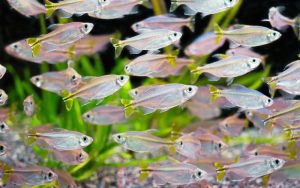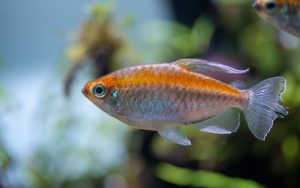Your goldfish isn’t just a pet—it’s a living, thriving member of your aquatic family. But what happens when it starts acting differently? Spotting Goldfish Sickness Symptoms early is crucial to keeping your finned friend happy and healthy.
From changes in behavior to physical signs of distress, understanding these symptoms can help you act quickly and prevent minor issues from becoming serious health concerns.
Let’s dive into the common warning signs of sick goldfish and what they mean for your goldfish’s well-being.
When goldfish fall ill, their behavior often provides the first clues. Goldfish disease symptoms may include gasping for air or hanging at the water’s surface, rapid breathing, or erratic swimming patterns.

They may also refuse food, leading to noticeable weight loss. If your goldfish is displaying these signs, it’s time to investigate their environment, diet, and overall health to determine the root cause. Identifying these red flags early can make all the difference in their recovery.
Table of Contents
ToggleGoldfish Sickness Symptoms Overview
With their mesmerizing beauty and soothing presence, Goldfish are cherished pets in many households. These small freshwater fish are known for their distinct coloration and elegant swimming patterns.
However, various factors can compromise their health, leading to diseases and ailments. By vigilantly monitoring your Goldfish and promptly addressing any signs of illness, you can improve their chances of full recovery.
5 Common Goldfish Diseases & Their Symptoms
Goldfish are prone to several common diseases that can affect their overall well-being. Recognizing the symptoms associated with these ailments is crucial for timely intervention. Here are some prevalent goldfish diseases and their characteristic signs:
Fin Rot: Damaged and Fraying Fins
Fin rot, caused by bacterial infection, affects the delicate fins of Goldfish. This condition can occur due to poor water quality or stress. Look out for fins that appear frayed, discolored, or decaying. The fin tissue may recede in severe cases, leading to significant damage.
Swim Bladder Disorder: Abnormal Buoyancy Control
Swim bladder disease (SBD) is a common ailment in Goldfish that affects their buoyancy control. The swim bladder, responsible for regulating its vertical position in the water, may become compromised. Affected Goldfish may have difficulty maintaining balance, resulting in floating or sinking issues.
Ich: White Spot Disease
Ich, also known as white spot disease, is extremely highly contagious parasitic infection that affects Golden fish. It manifests as tiny white spots resembling grains of salt on the fish’s body, gills, and fins. Infected Goldfish may exhibit excessive scratching against objects, as the parasite irritates fish’s skin.
Dropsy: Bloated Appearance and Raised Scales
Dropsy is a severe condition characterized by the accumulation of fluids in the Goldfish’s body cavity. Affected fish may exhibit a bloated appearance and raised scales resembling a pinecone. Dropsy is often indicative of underlying organ failure and requires immediate attention.
Anchor Worms: Visible External Parasites
Anchor worms are external parasites that attach themselves to the Goldfish’s body, fins, or gills. These worm-like organisms can cause irritation, inflammation, and secondary infections. Look for thin, thread-like worms protruding from your Veiltail Goldfish’s body or any signs of skin inflammation.
Identifying Sick Goldfish: 5 Critical Goldfish Sick Signs
It’s crucial to spot the early signs of disease. By identifying these symptoms promptly, you can take appropriate measures to address the underlying problem.
Here are five critical signs that may indicate your Goldfish is unwell:
Changes in Behavior and Appetite
One of the first signs of a sick goldfish is a notable change in behavior and appetite. If your Fancy Goldfish becomes lethargic, hides for prolonged periods, or shows disinterest in food, it may indicate an underlying health issue. Observe any unusual behaviors that deviate from their regular patterns.
Physical Abnormalities and Injuries
Inspect your Goldfish for any physical abnormalities or injuries. Look for visible wounds, torn fins, or redness on the body. These signs can indicate infection or injury and require proper care. Additionally, observe changes in body shape, such as bloating or excessive thinness.
Respiratory Distress: Gill’s Problems
Respiratory distress in Goldfish can manifest as rapid or complex breathing, gasping at the surface of the water, or increased gill movement. If you notice these signs, it could indicate a respiratory infection or gill-related issues. Proper oxygenation is vital for the fish’s well-being, so address this symptom promptly.
Unusual Fecal Matter and Abdominal Swelling
Pay attention to the quality and appearance of your Goldfish’s fecal matter. Discolored or stringy excrement may signify underlying health problems. Additionally, abdominal swelling or distension can indicate issues with digestion, organ function, or the accumulation of fluids.
Skin Issues: Ulcers and Fungal Infections
Inspect your Goldfish for any skin abnormalities. Ulcers, lesions, or red patches can indicate bacterial or fungal infections. These conditions can compromise the fish’s immune system and lead to further complications if left untreated.
Diagnosing and Treating Goldfish Diseases
Once you’ve identified signs of illness in your Goldfish, taking appropriate steps to diagnose and treat the underlying condition is essential. Here are some crucial measures to consider:
Isolating and Observing the Affected Fish
When you notice signs of illness in one of your Goldfish, it’s crucial to isolate the affected fish from others to prevent the spread of disease. Transfer the sick fish to a separate quarantine tank where you can closely monitor its behavior and symptoms.
Ensuring Optimal Water Conditions
Maintaining optimal water conditions is paramount for the health of your Goldfish. Poor water quality can exacerbate existing illnesses and make it difficult for the fish to recover. Regularly test the water parameters such as ammonia, nitrate, and pH levels, and perform necessary water changes to keep the environment clean and stable.
Implementing Medications and Treatments
You may need to administer medications or treatments to your Goldfish based on the specific symptoms and diagnosis. Consult a fish veterinarian or a knowledgeable aquatic professional to determine the appropriate action. Depending on the condition, medications may include antimicrobial treatments, antiparasitic agents, or salt baths.
Consultation with a Fish Veterinarian
If the fantail goldfish sick symptoms persist or worsen despite your efforts, you should seek professional assistance from a fish veterinarian. These experts specialize in fish health and can provide accurate diagnoses and tailored curing plans for your Goldfish. They can also offer guidance on preventive measures and general care.
Preventive Measures and Quarantine Procedures
Preventing diseases in Goldfish is critical to maintaining their long-term health. Some preventive measures include quarantining new fish before introducing them to an existing fish tank, maintaining a balanced and clean aquarium ecosystem, and ensuring a nutritious diet for your Goldfish. Practicing good hygiene and regularly monitoring their well-being can reduce the risk of illnesses.
Commonly Asked Questions about Sick Goldfish Symptoms and Treatment (FAQs)
How can I prevent goldfish diseases?
It’s essential to maintain a clean and balanced aquarium environment. Regularly test and treat the water tank, perform necessary changes, and avoid overfeeding. To prevent goldfish diseases, Quarantine new fish before introducing them to your main goldfish tank and provide a nutritious diet to support their immune system.
What should I feed my sick Goldfish?
When a goldfish is sick, providing a balanced and easily digestible diet is crucial. Opt for high-quality, live food, specialized fish food, or consider offering cooked peas or blanched vegetables. Consult a fish veterinarian for specific dietary recommendations based on your Goldfish’s condition.
Can I use aquarium salt to treat goldfish diseases?
Yes, aquarium salt can be used as a treatment for certain goldfish diseases. However, it’s crucial to follow proper dosage guidelines and consult with a fish veterinarian before administering salt baths or using salt as a medication. Different diseases require different treatments, so professional advice is recommended.
Should I separate the sick Goldfish from others?
Yes, it’s essential to separate a sick goldfish from others to prevent the spread of disease. Transfer the affected fish to a separate quarantine tank with appropriate filtration and monitoring. This allows you to closely observe the sick Goldfish and minimize the risk of infecting healthy fish tank mates.
How long does it take for a goldfish to recover from an illness?
The recovery time for a goldfish varies depending on the specific illness, its severity, and the treatment provided. Some conditions may resolve within a few days, while others require longer-term care. It’s essential to be patient, follow the recommended treatment plan, and consult a fish veterinarian for guidance throughout recovery.
What are some common goldfish diseases?
Some common goldfish diseases include fin rot, swim bladder disease, hole in the head disease, anchor worm, fluke, and dropsy.
What are the symptoms of goldfish disease?
The symptoms of goldfish diseases can vary, but some common signs include clamped fins or deterioration, gill discoloration, presence of parasites, ulcers, swollen abdomen, and abnormal swimming behavior.
How can I tell if my Goldfish is sick?
Some visual signs that your fish is sick include sluggishness, loss of appetite, fin deterioration, unusual coloration, and staying at the bottom of the tank or near the water’s surface for extended periods.
What causes goldfish diseases?
Various factors, including poor water conditions, inadequate nutrition, the introduction of infected fish or objects into the tank, and stress, can cause goldfish diseases.
How can I prevent goldfish diseases?
To prevent goldfish diseases, it is vital to maintain a clean and properly filtered tank, avoid overcrowding, provide a balanced diet, and regularly monitor the water quality. Quarantining new fish before introducing them to the tank can also help prevent the spread of diseases.
How can I treat goldfish diseases?
The treatment for goldfish diseases depends on the specific illness. It may involve medication, water parameter adjustments, isolation and treatment of infected fish, and maintaining optimal tank conditions. Consulting with a veterinarian or experienced fish keeper is recommended for proper diagnosis and treatment.
Can goldfish diseases be cured?
Many fish diseases can be cured with prompt and appropriate treatment. However, some conditions may have no known cure, and the focus is on symptom management and maintaining the best possible quality of life for the affected fish.
What should I do if my Goldfish has fish lice?
Fish lice are parasitic crustaceans that can infest Goldfish. You can use commercial medications specifically designed for this purpose to treat fish lice. Additionally, it would help if you improved water conditions and thoroughly cleaned the tank and any affected equipment.
How can I prevent goldfish diseases from spreading to other fish?
It is crucial to isolate infected individuals as soon as your goldfish disease symptoms are noticed. To prevent the spread of goldfish diseases to other fish, Quarantine new fish before adding them to the tank and regularly clean and disinfect any equipment or décor that has come into contact with the infected fish.
When should I consult a veterinarian for goldfish diseases?
It is recommended to consult a veterinarian if you are unsure about the diagnosis or treatment of goldfish diseases, if the symptoms worsen or persist despite treatment, or if multiple fish in your tank are affected. A veterinarian with experience in fish health can provide the best guidance for your specific situation.
Conclusion
In conclusion, recognizing the signs of sickness in your Goldfish is crucial for their well-being. By closely monitoring their behavior, physical appearance, and overall health, you can identify potential goldfish sickness symptoms early on and provide the necessary care and treatment. Remember to maintain optimal water conditions, consult with professionals when needed, and take preventive measures to ensure a long, healthy goldfish life.
You might also like
- Goldfish Sickness: 7 Common Goldfish Diseases & Quick Fixes!
- Goldfish Dropsy or Pregnant: Don’t Miss These 7 Clear Signs!
- Are Fancy Ranchu Goldfish Aggressive: (A Comprehensive Guide)
- Why Is My Goldfish Not Eating or Swimming: 5 Causes & Solutions!
- Why Do My Goldfish Chase Each Other: (5 Causes & Solutions)
- Goldfish Breeding Pond: 7 Essential Tips for a Stunning Pond
- 10 Best Fantail Goldfish Tank Mates: Compatibility Guide 101
- Tank Size for Fantail Goldfish: 3 Expert Tips for A Thriving Aquarium
- Goldfish Anchor Worm 101: Expert Tips and Proven Remedies!




